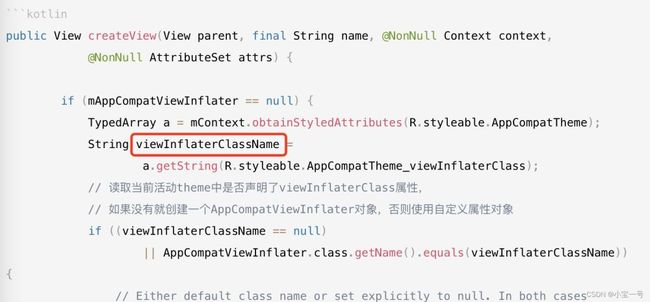前言
本篇技术实现主要是运行是代理,不涉及到插桩技术,不引入插件,对业务影响点最小
技术难点
1. 如何拦截到所有的view的点击事件
view有个setAccessibilityDelegate方法可以通过自定义一个全局的AccessibilityDelegate对象来监听view的点击事件
object EventTrackerAccessibilityDelegate : View.AccessibilityDelegate() {
override fun sendAccessibilityEvent(host: View?, eventType: Int) {
super.sendAccessibilityEvent(host, eventType)
if (eventType == AccessibilityEvent.TYPE_VIEW_CLICKED) {
host?.let {
// 统一做埋点
}
}
}
}
通过给每个View设置上述单例对象,这样每当View被点击时,View.performClick内部就会触发上述方法。这样就能够拦截view的点击事件,而不用修改业务层代码。
2. 如何对app所有的view设置setAccessibilityDelegate
解决这个问题,就得拦截到app中view的创建。我们先要对Android中View的创建流程需要明白,对于android中的view创建,我们先从AppCompatActivity.onCreate方法入手
@Override
protected void onCreate(@Nullable Bundle savedInstanceState) {
final AppCompatDelegate delegate = getDelegate();
delegate.installViewFactory(); //重点
delegate.onCreate(savedInstanceState);
super.onCreate(savedInstanceState);
}
我们重点看installViewFactory方法,delegate返回的实际类型为AppCompatDelegateImpl,它继承了AppCompatDelegate抽象类
// AppCompatDelegateImpl.java
@Override
public void installViewFactory() {
LayoutInflater layoutInflater = LayoutInflater.from(mContext);
if (layoutInflater.getFactory() == null) {
LayoutInflaterCompat.setFactory2(layoutInflater, this);
} else {
if (!(layoutInflater.getFactory2() instanceof AppCompatDelegateImpl)) {
Log.i(TAG, "The Activity's LayoutInflater already has a Factory installed"
+ " so we can not install AppCompat's");
}
}
}
这里面可以看到内部调用了LayoutInflaterCompat**.setFactory2方法,第二个参数传入了this;其实可以理解view的创建托管给了AppCompatDelegateImpl.onCreateView了;我们继续看onCreateView**内部做了什么
public View createView(View parent, final String name, @NonNull Context context,
@NonNull AttributeSet attrs) {
if (mAppCompatViewInflater == null) {
TypedArray a = mContext.obtainStyledAttributes(R.styleable.AppCompatTheme);
String viewInflaterClassName =
a.getString(R.styleable.AppCompatTheme_viewInflaterClass);
// 读取当前活动theme中是否声明了viewInflaterClass属性,
// 如果没有就创建一个AppCompatViewInflater对象,否则使用自定义属性对象
if ((viewInflaterClassName == null)
|| AppCompatViewInflater.class.getName().equals(viewInflaterClassName)) {
// Either default class name or set explicitly to null. In both cases
// create the base inflater (no reflection)
mAppCompatViewInflater = new AppCompatViewInflater();
} else {
try {
Class viewInflaterClass = Class.forName(viewInflaterClassName);
mAppCompatViewInflater =
(AppCompatViewInflater) viewInflaterClass.getDeclaredConstructor()
.newInstance();
} catch (Throwable t) {
Log.i(TAG, "Failed to instantiate custom view inflater "
+ viewInflaterClassName + ". Falling back to default.", t);
mAppCompatViewInflater = new AppCompatViewInflater();
}
}
}
...
// 返回view
return mAppCompatViewInflater.createView(parent, name, context, attrs, inheritContext,
IS_PRE_LOLLIPOP, /* Only read android:theme pre-L (L+ handles this anyway) */
true, /* Read read app:theme as a fallback at all times for legacy reasons */
VectorEnabledTintResources.shouldBeUsed() /* Only tint wrap the context if enabled */
);
}
从上述代码可以看到负责view的创建的其实是mAppCompatViewInflater对象;思路来了,我们可以通过自定义主题样式中viewInflaterClass属性,来接管view的创建
Style.xml中添加配置
view创建
@Keep
class DBSAppCompatViewInflater : AppCompatViewInflater() {
private val mViewCreateHelper by lazy { ViewCreateHelper() }
override fun createView(context: Context?, name: String?, attrs: AttributeSet?): View? {
return when (name) {
try {
mViewCreateHelper.createViewFromTag(context, name, attrs)
} catch (e: Exception) {
// noNeed throw exception, just return null
null
}
}
}
}
ViewCreateHelper主要是通过全路径名以反射形式创建view;你可以参考AppCompatViewInflater类中实现
DBSAppCompatViewInflater方法我们实现了自定义view的方法;(但它只是view创建的一部分,所以此处没有对view设置EventTrackerAccessibilityDelegate),外部调用的只是AppCompatViewInflater.createView;
所以为了拦截所有view的创建,我们需要对activity中getDelagate方法做包装; 有人可能会想能不能自定义Delegate,自己实现AppCompatDelegate抽象类吗?;答案是不行(抽象类中声明了私有方法,子类直接继承编译报错)也不建议这样做,自定义类去做需要实现许多方法,稳定性太差;能不能直接继承AppCompatDelegateImpl类呢?答案也是不行
@RestrictTo(LIBRARY)
class AppCompatDelegateImpl extends AppCompatDelegate
implements MenuBuilder.Callback, LayoutInflater.Factory2 {
}
从源码可以看出compat包中对AppCompatDelegateImpl类做了限制,只能用在那个库中LIBRARY中使用
Restrict usage to code within the same library (e.g. the same gradle group ID and artifact ID).
所以我们只能对Delegate增加一层包装,delegate现在已经拥有创建view的能力,我们只要在install之前对LayoutInflater设置Factory2中方法,在方法中直接引用delegate对象创建view就可以了;
实现一个LayoutIInflater.Factory2接口
class AppLayoutInflaterFactory2Proxy(private val delegate: AppCompatDelegate)
: LayoutInflater.Factory2 {
override fun onCreateView(parent: View?, name: String?, context: Context?, attrs: AttributeSet): View? {
context ?: return null
delegate.createView(parent, name, context, attrs)?.apply {
// 无痕埋点启用,则绑定,否则不做处理
if (EventAutoTrackerCfg.enable) {
if (ViewCompat.getAccessibilityDelegate(this) == null) {
accessibilityDelegate = EventTrackerAccessibilityDelegate
}
}
}
}
override fun onCreateView(name: String?, context: Context?, attrs: AttributeSet): View? {
return onCreateView(null, name, context, attrs)
}
}
Activity基类中复写getDelegate方法
override fun getDelegate(): AppCompatDelegate {
val delegate = super.getDelegate()
try {
val inflater = LayoutInflater.from(this)
// avoid throw exception when invoking method multiple times
if (inflater.factory == null) {
LayoutInflaterCompat.setFactory2(inflater, MKAppLayoutInflaterFactory2Proxy(delegate) )
}
} catch (e: Exception) {
// do nothing
}
return delegate
}
这样整个无痕埋点技术实现方案已经完成了
可以优化的点
当前技术实现中需要在Style.xml中添加相关viewInflaterClass配置,有些耦合
优化技术实现方案:可以通过插桩方式修改viewInflaterClassName的值,对于我们自己业务类(通过context判断)设置我们自定义的InflaterClassName,第三方sdk可以控制保持不变
总结
到此这篇关于无痕埋点在Android中实现的文章就介绍到这了,更多相关Android实现无痕埋点内容请搜索脚本之家以前的文章或继续浏览下面的相关文章希望大家以后多多支持脚本之家!
